If you didn’t catch the 20 Activities for Your Virtual and Remote Teams series late last year, I covered 20 different activities – from:
· Time Management and Prioritizing
· Matrix Management. Check out Teams365 #1421 around Matrix Management.
· Work-life
· Intercultural skills and knowledge
· Project Management
· Emotional Intelligence
Given that this past month at the Teams365 blog and in the Teams365 Leadership Lab we have been looking at Emotional Intelligence I thought it would be appropriate to zero into the Emotional Intelligence as core skill:
Here's what I wrote in Teams365 #1435:
In the virtual space, helping team members become more proficient at Emotional Intelligence (EI) skills, which not only help with getting things done, but it helps people in self-management (managing triggers, and enablers), and in building effective working relationships.
Under the umbrella of EI we can have more than a dozen skill sets – from optimism, to conflict management, to developing others. It can be useful to have the team take stock of where they are at in each of the four domains of Emotional Intelligence. You may want to dedicate time throughout the year to this topic – perhaps addressing each one of the four areas every quarter.
“The research shows that for jobs of all kinds, emotional intelligence is twice as important an ingredient of outstanding performance as ability and technical skill combined. The higher you go in the organization, the more important these qualities are for success. When it comes to leadership, they are almost everything.”
- Daniel Goleman
The four components of Emotional Intelligence are critical for virtual teams. Today we are going to explore the first two – Self Awareness and Social Awareness:
Self-awareness: Knowing ourselves:
Under self-awareness, skills such as self-confidence, and accurate self-awareness exist. You may want to read Primal Leadership by Goleman, Boyatzis and McKee for more on this.
How do we develop these skills in our teams, and ourselves as leaders? As a quarterly activity you may want to undertake an assessment so that the team learns more about themselves and their natural style. Some of us are big picture thinkers while others small picture thinkers. In learning more about ourselves we can understand:
Our enablers – what helps us do our work
Our derailers – things that may get in the way of our work
Our triggers – things that may hit our buttons to either super-charge us to set us back
Our natural styles – where we go to in times of stress or pressure.
Social Awareness
The second I wanted to touch on in this posts is that of social awareness. It’s about being aware of, and knowing the emotions of those around you. Three skills exist in this area and as outlined in Primal Leadership are:
- Empathy: understanding the other person’s emotions, needs and concerns.
- Organizational Awareness: the ability to understand the politics within an organization and how these affect the people working in them.
- Service: the ability to understand and meet the needs of clients and customers. (page225, Primal Leadership)
Questions to consider:
What's important about Emotional Intelligence for you and your team?
What learning would you like to do in this area?
What opportunities do you have to build more capacity in your team in these areas?
Which I followed up with Teams365 #1436:
Area 3 is about Self-Management.
Our ability to manage our emotions and motivate ourselves is critical for virtual teams. Helping team members understand why we get triggered or other is important
Self-management is about building onto what we know about ourselves and being able to manage accordingly based on our awareness.
Our ability to follow through, motivate ourselves and adapt to change is part of this skill set.
Skills which reside in this area, according to Goleman, Boyatzis and McKee, are :
Self-control
Transparency
Adaptability
Achievement
Initiative
and Optimism
Activities to help teams with self-management usually involve helping team members identify what are their triggers, and what are their habits. It usually involves enhancing their self-awareness as well.
Here's a quick activity to build self-management:
Get team members to reflect on the following questions, and potentially write them down:
1. What are the top 3 activities that provide you with the opportunity to achieve? What are the habits (or things you do consistently) that help you be successful in this area?
2. Think of a time recently when you had to adapt tin order to be successful? What was the situation? What did you do to adapt? What did you learn from this experience?
3. Think of a time recently when you had to self-manage? What triggered you? What did you do to react? how did this reaction influence the situation? What can you do in the future to aim for a successful outcome next time you are triggered?
4. What are two or three areas you can demonstrate more initiative in, in the new year? What would it look like? What impact would that have?
The arena of optimism is another area you might want to explore with team members. There is a continuously growing body of knowledge and practice around optimism. To explore these question you may want to look at:
What is your mindset around optimism? Are you a glass half full, or half empty individual?
What impact does your mindset have on results?
The fourth area of Emotional Intelligence is that of Relationship Management – Being able to navigate relationships and work effectively with others.
Building relationships virtually is a key priority for virtual team members, perhaps to an even greater extent. In the in person realm, people are very close in proximity and spending time with peers and other co-workers is an every day occurrence. In the virtual space we need to be more intentional in building relationships. Business still occurs through relationships, whether you are virtual, work remote or work beside someone else.
You can check out the post which highlights all 20 of them here at Teams365 # 1443.
This month we've been exploring Emotional Intelligence for Leaders at the Teams365 Leadership Lab. Later this week my second call of the month will focus on building Emotional Intelligence in your Teams. If you are a team leader, or aspiring team leader, I hope you will consider joining us for this annual learning and coaching group which meets twice a month throughout the year. Each month has a different focus.
With best wishes,
Jennifer
Potentials Realized | Coaching Team Leaders
Team and Leadership Development | Coaching | Retreats.
Follow us on Twitter @Teams365
Phone: (416)996-8326
Looking to enhance your virtual conversations - Conference calls? Webinars? Virtual coaching work? Pick up a copy of my new book, Effective Virtual Conversations, at Amazon.
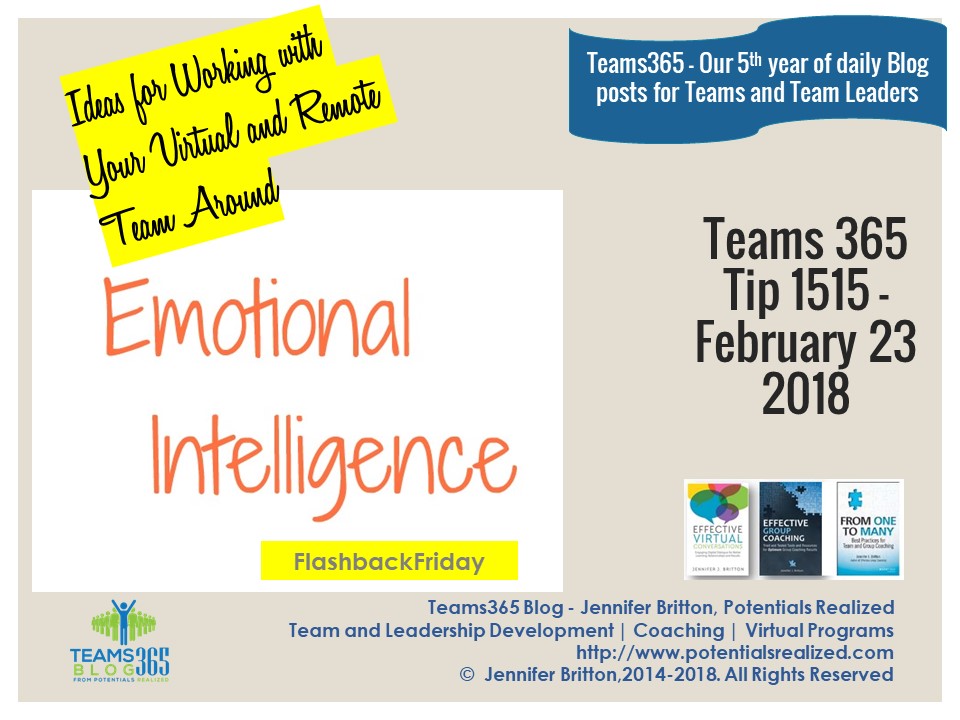
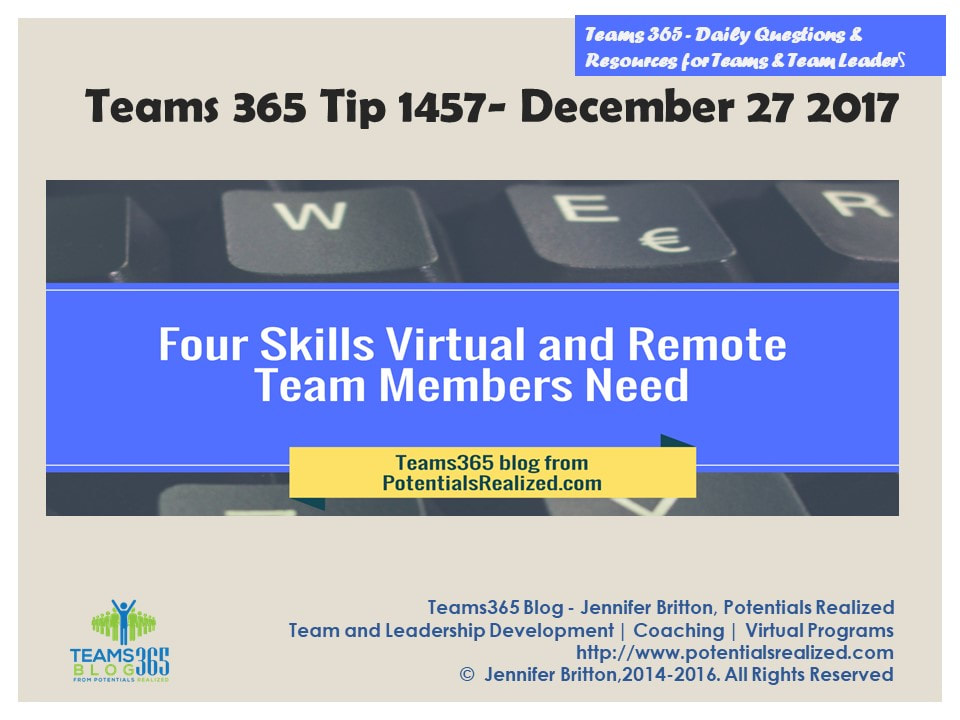
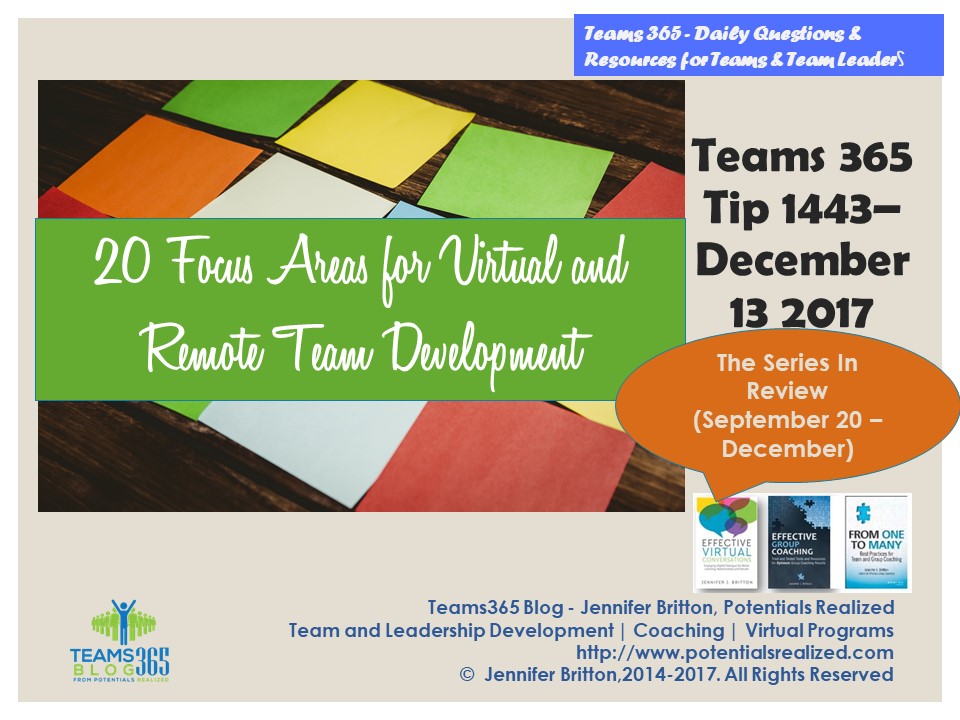
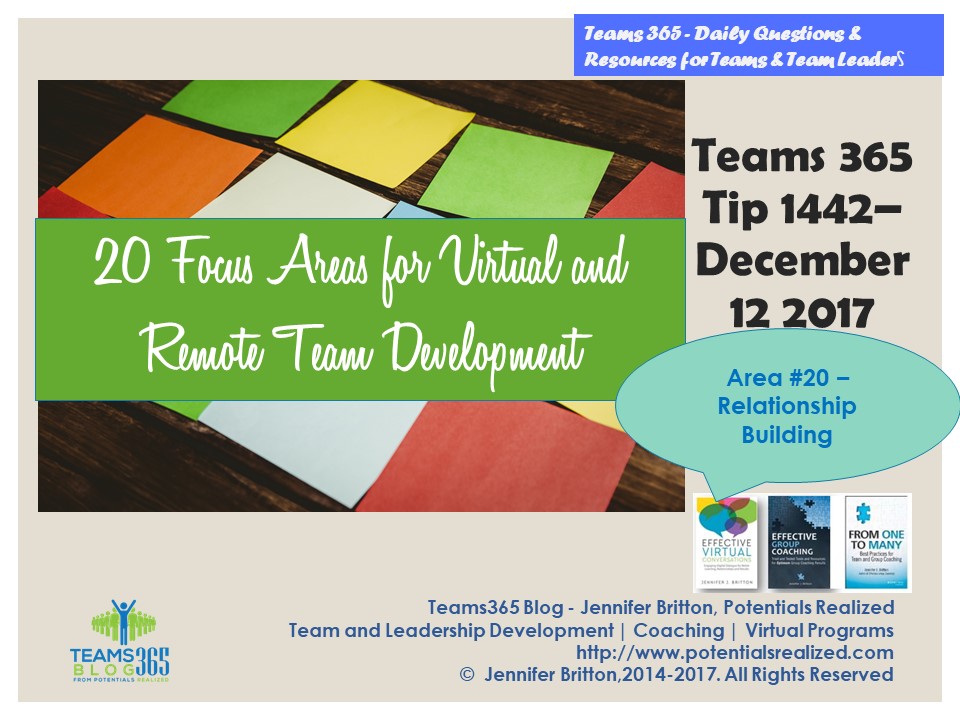
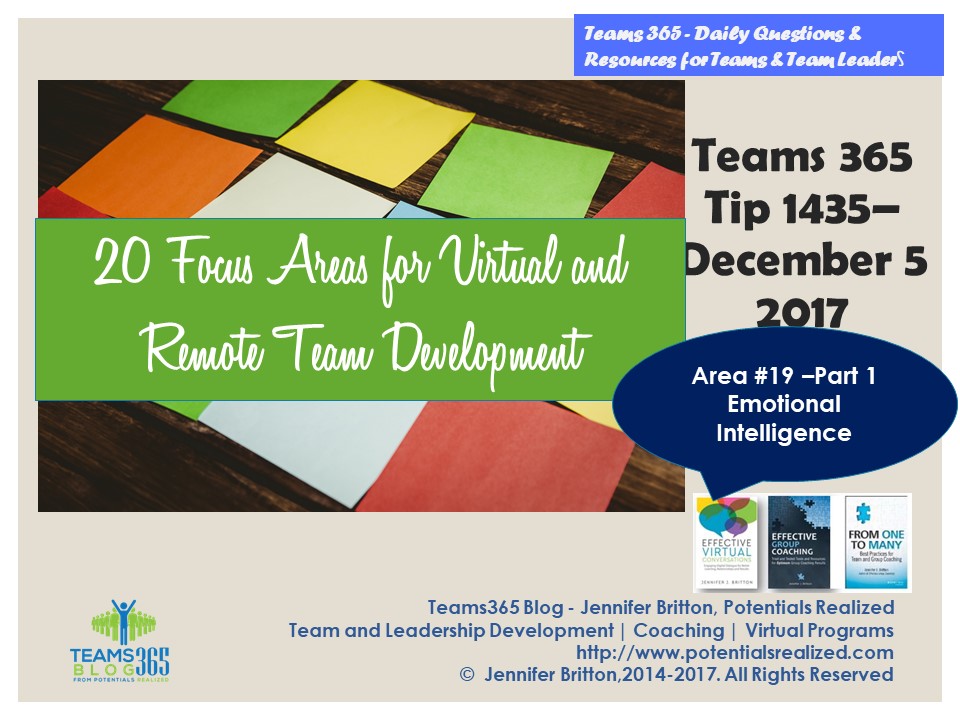
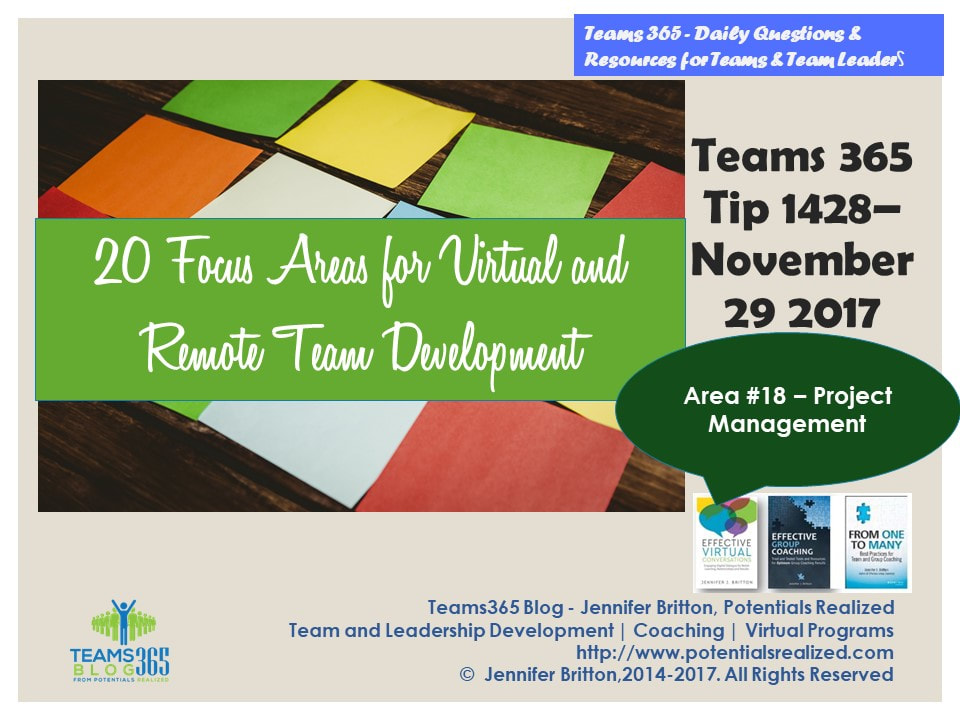
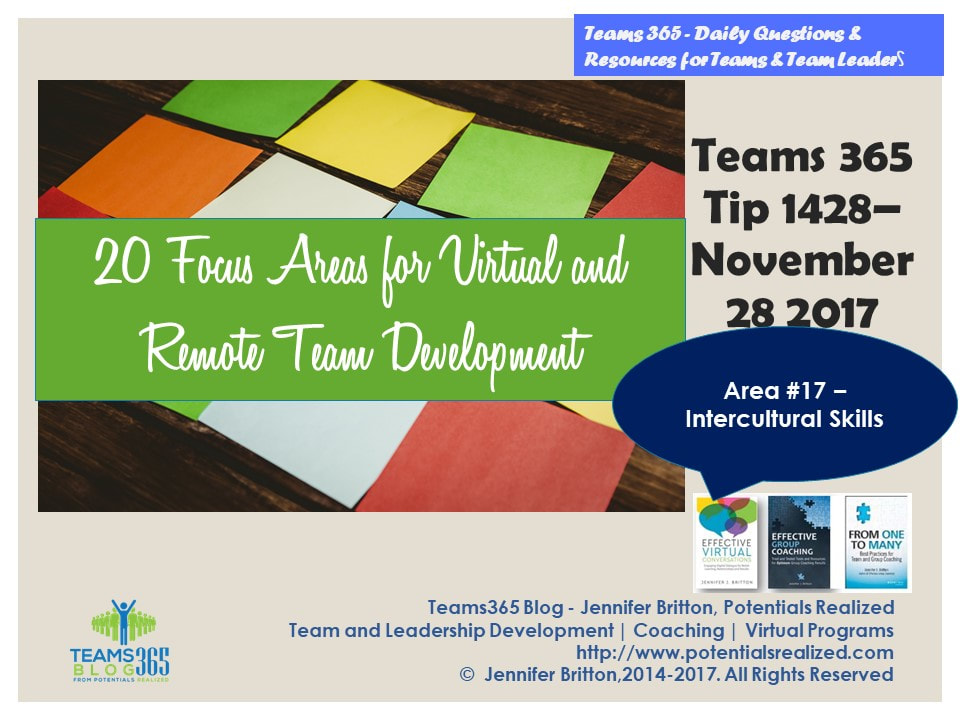
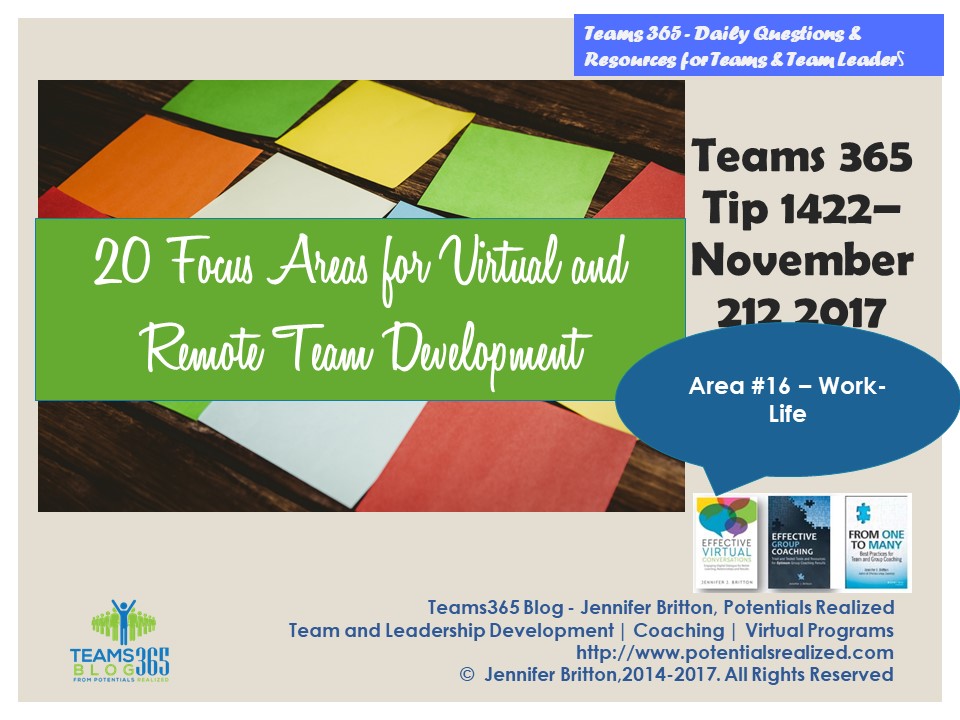
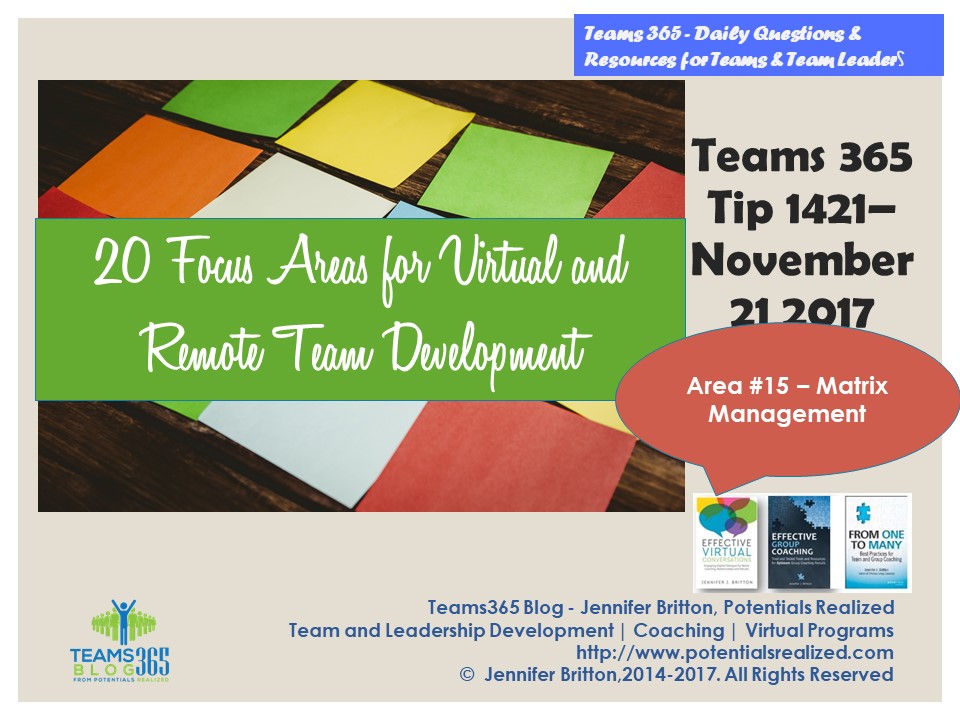
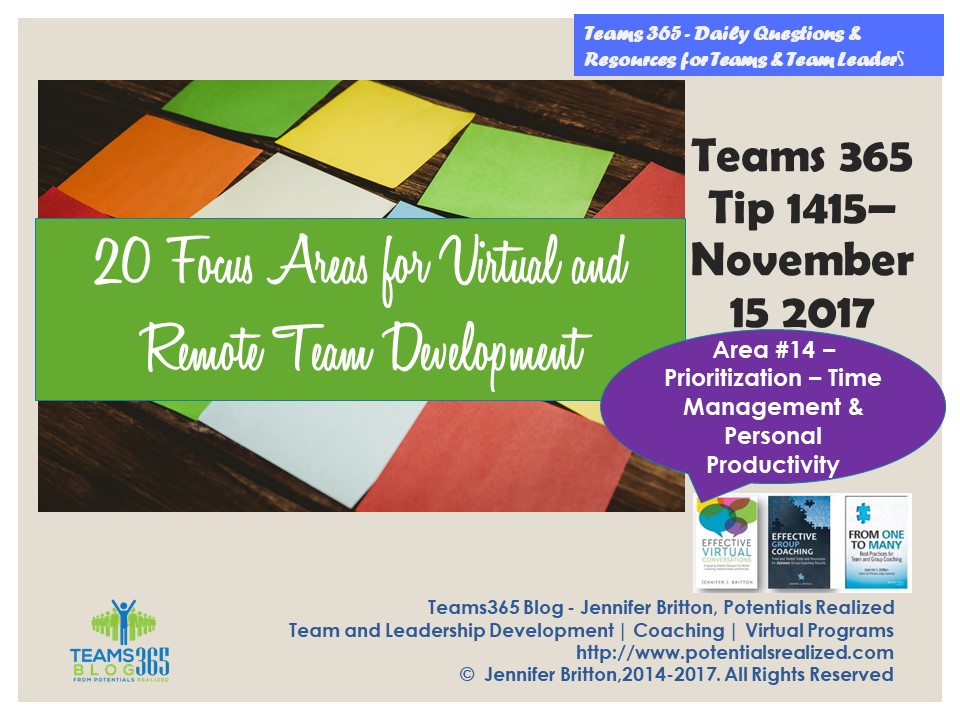
 RSS Feed
RSS Feed





